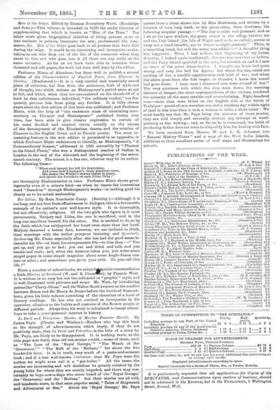Professor Minto, of Aberdeen, has done well to publish a
second edition of his Characteristics of English Poets, from Chaucer to Shirley. (Blackwood.)—It is a very careful and essentially sound piece of criticism, but free from the archaisms, both of style and of thought, into which writers on Shakespeare's period seem so apt to fall, and which, when they are enconntered on the threshold of a book by that unfortunate individual, "the ordinary reader," too fre- quently . prevent him from going any farther. It is fatly eleven years since the first edition of this book was published ; and Professor Minto, with the help of "the enormous mass of interesting com- mentary on Chaucer and Shakespeare" published during that time, has been able to give clearer expression to certain of his more decided and original views, notably on the causes of the development of the Elizabethan drama, and the relation of Chaucer to the English Court and to French poetry. The most in- teresting feature in the new edition is presented in an appendix, in which Professor Minto endeavours to identify, as Shakespeare's, " A Commendatory Sonnet," addressed in 1591 ostensibly by "Phaeton to his friend Florio," who was a distinguished teacher of Italian in London in the end of the sixteenth and the beginning of the seven- teenth century. The sonnet is a fine one, whoever may be its author. The following lines- " When each branch has lett his flourishing,
And green-look'd Summer's shady pleasures cease, She makes the Winters storms repose in peace, And spends her franchise on each living thing ;"
are thoroughly Shakespearian in tone. Professor Minto shows great ingenuity even of a minute kind—as when he traces the interesting word " franchise " through Shakespeare's works—in making good his theory as to its actual authorship.


































 Previous page
Previous page